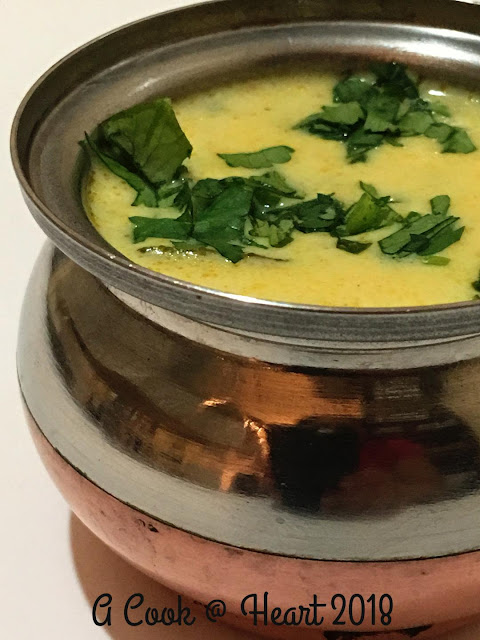Every Marathi household has a copy of this, either borrowed from mom or one that was gifted to a new bride.
I'm talking about Kamala bai Ogale's famous cookbook, 'Ruchira'.
This is one of the oldest cookbooks and is still very popular. The recipes (in book 1) concentrate on Marathi cuisine and include a range of simple, day to day recipes and some complex ones as well.
The book gained popularity because of the dependable recipes but in my opinion, also because, it used simple measurement tools, the 'vaati' (katori / steel bowl) and 'chamcha' (steel spoon used in every kitchen). This made it easy for the Indian home maker and cook, who largely depended on eyeballing everything when cooking.
My Mother has an old copy of Ruchira, I never really looked at it, it was just... there. It was because I did not have enough time on my hands to cook (because of work pressure) or just because it was in Marathi, which I was not too comfortable reading.
But I love reading it now and cooking from the book.
I grew up up in a Marathi- Kannada home, my Mom mostly made Maharashtrian food and it wasn't until I started blogging that I realized how vast the range of recipes was.
There are so many variations to everyday recipes and just when you think you know a bit more, you realize, ah! no! that was just the tip of the iceberg.
Take for example, the humble 'pithla'.
This ubiquitous 'curry', is something most people won't bother talking about. It's one of those, 'taken for granted' recipes. When there is a shortage of time or ingredients, this is the go-to recipe.
It requires few ingredients, the base is 'besan' (chickpea flour) add to boiling (tempered) water.
There are variations, like using garlic or even a different base (I've used kulith - horsegram flour).
But what I never imagined was using milk, instead of water.
So when I was leafing through the recipes in Ruchira, I spied, 'Dudhatla pithla' I was intrigued.
I would never have imagined using milk in a recipe that wasn't sweet. You learn something new, everyday!
This recipe comes together in a jiffy and is very mild and makes a nice change, once in a while.
This recipe is very forgiving, just be careful as it is milk based and follow the steps as mentioned to ensure that the milk does not curdle.
I halved the proportion, that was more than enough for the 3 of us.
I used
2 Cups of Milk
1/4 cup Besan
1 Green chili, chopped
1/2 tsp Cumin seeds, powdered
Salt to taste
Chopped Cilantro to garnish
Fresh coconut to garnish ( I did not use )
2 Tbs Oil
1tsp Mustard seeds
Hefty pinch, Asafetida
1/4tsp Turmeric powder
Curry leaves.
Dissolve the besan in 1/4 cup milk and make a smooth paste. Set aside.
Heat a deep sauce pot or a kadhai. Add the oil and one the oil is hot (not smoking),add the mustard seeds.
As the mustard seeds pops, lower the heat and add the asafetida, turmeric, curry leaves and the chopped green chili. Add the cumin powder and stir to mix.
Now add the milk (1 1/2 cup) and stir to combine. Let the milk come to a boil, add the besan (mixed in milk) and stir to mix it in well.
Once the besan is cooked ( the consistency changes, it becomes tick and has a slight shine) add the salt.
Let it cook for a couple of minutes.
Garnish with coconut and cilantro before serving.
Serve ladled over plain, steaming hot rice with some pickles and papad for a comforting meal.
Notes:
-This is a mild Pithla, add another green chili if you want to amp up the heat. But this proportion is kid approved.
- Be careful with the heat, keeping the flame on high or induction on high, will result in milk burning and smelling awful. Keep the heat at medium and stir frequently.







2 comments:
Interesting! Never heard of pithla with milk. My MIL makes it with ‘taak’ which tastes wonderful. Slightly sour, slightly spicy, very yummy!
Oh yes! ‘Taakatla pithla’ is also very tasty! I love that version too.
Post a Comment